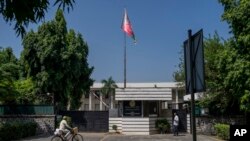The first high level diplomatic meeting held between India and the Taliban leadership marked a significant step in rebuilding New Delhi’s influence in Afghanistan, according to analysts. They say New Delhi’s growing engagement with the Taliban is prompted by strategic considerations in the Central Asian country that has important implications for its security and is likely to deepen amid growing tensions between the Taliban and Pakistan.
In the meeting between Indian foreign secretary Vikram Misri and acting Taliban Foreign Minister Amir Khan Muttaqi, held in Dubai last week, India agreed to consider engaging in development projects in Afghanistan “in the near future” and provide more support to the health sector and refugee rehabilitation. Both sides also discussed boosting trade ties.
Calling India a “significant regional and economic partner,” the Afghan foreign ministry said in a statement that “we want to strengthen political and economic relations with India."
The engagement marked a major shift since the Taliban takeover of Afghanistan in 2021, which was seen as a huge diplomatic setback for India’s two-decade long efforts to build deeper ties with Kabul.
“New Delhi’s approach is a pragmatic one, grounded in the view that isolating the Taliban will make it tougher to achieve its goals in Afghanistan,” Michael Kugelman, director of the South Asia Institute at the Wilson Center, told VOA in emailed comments.
The Taliban’s return had raised fears in New Delhi that Afghanistan will become a haven for militants from Pakistan who have been at the forefront of a three-decade violent separatist insurgency in Indian Kashmir.
But analysts point out that the Taliban leadership has built confidence in New Delhi by not doing anything that goes against India’s security interests.
“They have observed their commitments to not allow anti-India terror activity on their soil quite scrupulously. So the level of engagement has been upgraded steadily,” said Sushant Sareen, senior fellow at the Observer Research Foundation. “Afghanistan is seen as the epicenter of the arc of instability in this region and it is critical for India’s interests to be present there.”
India’s détente with the Taliban began in 2022 when it started dispatching food and medicine as part of humanitarian aid to Afghanistan. In the same year, it reopened its mission in Kabul with a small “technical team.”
The engagement between the two countries likely will gain momentum amid tensions between Kabul and Islamabad over Pakistan’s allegations that the Taliban support militants linked to the outlawed Tehrik-i-Taliban Pakistan, or TTP, in carrying out attacks against Pakistani civilians and security forces.
“India’s outreach to the Taliban is certainly easier given Pakistan’s messy ties with the Taliban,” Kugelman said. “And given the reality of India-Pakistan rivalry, New Delhi likely sees an opportunity to exploit Pakistan’s tensions with the Taliban and pursue closer ties with the Taliban, to gain an upper hand in a longstanding competition between India and Pakistan for influence in Afghanistan.”
During last week’s meeting between Misri and Muttaqi, India underlined “its readiness to respond to the urgent developmental needs of the Afghan people.”
Before the Taliban takeover in 2021, India was the largest regional provider of development aid to Kabul and had invested about $3 billion in projects that included schools, roads, dams and hospitals. Many of those projects had stalled after the Taliban takeover. Some could restart, analysts say.
“The Indian goal is to protect the good things India has done over the decades, and renew its developmental activities,” said Chintamani Mahapatra, founder of the Kalinga Institute of Indo Pacific Studies in New Delhi. “Afghanistan is a very important country for us, so India is interested in engaging the Taliban rather than isolating it, no matter who is in the seat of power. And to achieve stability, there needs to be a modicum of economic development.”
Both sides also agreed to promote the use of Iran’s Chabahar port for supporting trade and commercial activities – the port, which India is helping develop, is seen as crucial for both sides. India wants to strengthen connectivity via Afghanistan and Iran to Central Asia which it cannot access directly by land due to Pakistan's refusal of transit rights. For landlocked Afghanistan, which has to rely heavily on Pakistani land routes and seaports to conduct trade, the Chabahar port provides an alternate route.
The Taliban also has urged New Delhi to issue visas to Afghan businessmen, patients and students — a process that virtually halted after its takeover because of the closure of Indian consulates, security concerns and because India, like most countries, does not officially recognize the Taliban. But New Delhi will take a calibrated approach toward potential visitors from Afghanistan, according to analyst Sareen.
“India is not ready to open the floodgates for Afghans coming into India. New Delhi will remain cautious, but it will continue to deepen the engagement. Because while India has reservations on some aspects of the Taliban’s policies towards women and its ideology, realism is guiding Indian policy. After all, it cannot pretend that Afghanistan does not exist anymore. We are virtually their next door neighbors,” Sareen said.
India’s decision to build ties with the Taliban at a time when countries like Russia and China are strengthening relations with Kabul, is likely to find support in countries like the United States.
“As the U.S. contemplates how to approach the Taliban when it comes to sensitive but pressing issues, from Americans still being held captive in Afghanistan to concerns about Islamic State terrorism, it will likely find it useful that a key US partner has decided to opt for the path of engagement,” Kugelman said.





